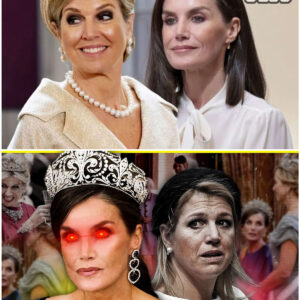Terrence Howard Issues a Warning Following Alleged Blackballing of Taraji P. Henson: A Comprehensive Analysis
In a dramatic development within the entertainment industry, actor Terrence Howard has issued a stark warning in response to allegations that his former co-star, Taraji P. Henson, has been subjected to blackballing. This revelation has ignited widespread speculation and concern, shedding light on the intricate dynamics of Hollywood and the potential repercussions for actors who speak out against perceived injustices.
Taraji P. Henson, celebrated for her dynamic performances in film and television, has reportedly faced professional repercussions following unspecified actions or statements. The term “blackballing” suggests a concerted effort within the industry to exclude or limit opportunities for an individual, typically as a form of retaliation or punishment. The circumstances surrounding Henson’s alleged blackballing remain shrouded in speculation, prompting heightened interest and scrutiny.
Terrence Howard, known for his roles in critically acclaimed films such as “Hustle & Flow” and “Iron Man,” has emerged as a prominent voice within Hollywood. His reputation as a talented actor is matched by his willingness to address controversial topics and advocate for equity within the industry. Howard’s decision to publicly address Henson’s situation underscores his commitment to transparency and fairness in an industry often criticized for its lack of diversity and inclusivity.
Terrence Howard’s warning serves as a cautionary tale for those navigating the complexities of Hollywood. By acknowledging Henson’s alleged blackballing, Howard draws attention to broader issues of power dynamics, accountability, and the treatment of Black artists within the entertainment industry. His stance invites reflection on the consequences of speaking out against perceived injustices and the potential ramifications for one’s career trajectory.
The media’s response to Terrence Howard’s warning has been swift and multifaceted, with news outlets dissecting the implications of his statement and speculating on the circumstances surrounding Henson’s alleged blackballing. Discussions have centered on the prevalence of industry practices that may disproportionately affect marginalized groups and the need for greater transparency in decision-making processes.

Amidst the fervor of speculation, ethical considerations regarding the fairness of industry practices and the protection of individuals’ reputations have emerged as critical points of contention. The legal implications of blackballing allegations, including potential claims of discrimination or retaliation, highlight the complex intersection of personal integrity, professional advancement, and industry norms.
Beyond the immediate controversy, Terrence Howard’s warning and the allegations surrounding Taraji P. Henson’s alleged blackballing resonate within broader societal discussions about diversity, representation, and equity in the entertainment industry. The incident underscores ongoing challenges faced by Black artists and other underrepresented groups in securing equitable opportunities and fair treatment.
As the narrative unfolds, Terrence Howard’s warning following the alleged blackballing of Taraji P. Henson prompts critical reflection on the state of diversity, accountability, and ethical conduct within Hollywood. The incident serves as a catalyst for conversations about the power dynamics that shape career trajectories and the responsibilities of industry stakeholders to uphold fairness and inclusivity.
In conclusion, Terrence Howard’s vocal stance on the alleged blackballing of Taraji P. Henson amplifies longstanding concerns about equity and justice within the entertainment industry. His warning resonates as a poignant reminder of the challenges faced by marginalized artists and the imperative to foster an environment that values diversity, respects individual integrity, and promotes equitable opportunities for all. As the industry grapples with these issues, the enduring impact on industry practices and cultural attitudes towards representation remains a pivotal consideration moving forward.
News
Los científicos finalmente abrieron la tumba de Goliat después de miles de años, descubriendo secretos que sorprendieron y confundieron a todos.
Los científicos finalmente abrieron la tumba de Goliat después de miles de años, descubriendo secretos que han dejado a todos en shock y confusión. Este monumental descubrimiento, que durante mucho tiempo ha sido tema de especulación y mito, ha producido…
LA PRINCESA LEONOR y LA INFANTA SOFÍA PARALIZAN ACTO REAL con SORPRESA PARA EL REY FELIPE ¡LLORARON
La Princesa Leonor y la Infanta Sofía Paralizan el Acto Real con Sorpresa para el Rey Felipe: ¡Lloraron! En el corazón de la vida pública española, los eventos reales suelen ser espectáculos de protocolo, elegancia y seriedad. Sin embargo, a…
5 insólitas costumbres de la Familia Real Española que Letizia Ortiz se niega a seguir
Conoce las ocasiones en las que el carácter rebelde la esposa del rey Felipe VI ha salido a relucir al resistirse a formar parte de las costumbres de los Borbón Letizia se mantiene renuente a seguir algunas de las costumbres…
El estilo de vida ultra lujoso de la Familia Real Española
El Estilo de Vida Ultra Lujoso de la Familia Real Española La Familia Real Española, encabezada por el Rey Felipe VI y la Reina Letizia, es un símbolo de elegancia y sofisticación. Su estilo de vida ultra lujoso no solo…
EL ODIOSO MOTIVO POR EL QUE LA REINA LETIZIA DE ESPAÑA RIVALIZA CON LA REINA MÁXIMA DE HOLANDA
El Odioso Motivo por el que la Reina Letizia de España Rivaliza con la Reina Máxima de los Países Bajos: Un Conflicto de Estilo y Poder En el mundo de la realeza, donde la imagen y la percepción pública juegan…
La Princesa LEONOR: El Lado Desconocido de su LUJOSA VIDA
La Princesa Leonor: El Lado Desconocido de su Lujosa Vida La Princesa Leonor de Borbón, heredera al trono de España, es una figura que despierta un interés considerable tanto en el ámbito nacional como internacional. A menudo vista en eventos…
End of content
No more pages to load











